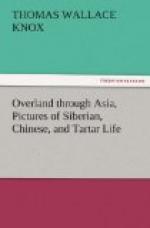The product of the Nerchinsk mines has been silver, gold, and lead. The search for silver and lead has diminished since the mines were opened to private enterprise. At one time 40,000 poods of lead were produced here annually, most of it being sent to the Altai mountains to be employed in reducing silver. In most places where explored the country is rich in gold, and I have little doubt that thorough prospecting would reveal many placers equaling the best of those in California.
Very few exiles are now sent to Nerchinsk in comparison with the numbers formerly banished there. Under the reign of Nicholas and his father Nerchinsk received its greatest accessions, the Polish revolutions and the revolt of 1825 contributing largely to its population. Places of exile have always been selected with relation to the offence and character of the prisoners. The worst offenders, either political or criminal, were generally sent to the mines of Nerchinsk, their terms of service varying from two to twenty years, or for life. I was told that the longest sentence now given is for twenty years. The condition of prisoners in former times was doubtless bad, and there are many stories of cruelty and extortion practiced by keepers and commandants. The dwellings of prisoners were frequently no better than the huts of savages; their food and clothing were poor and insufficient; they were compelled to labor in half frozen mud and water for twelve or fourteen hours daily, and beaten when they faltered.
The treatment of prisoners depended greatly upon the character of the commandant of the mines. Of the brutality of some officials and the kindness of others there can be little doubt. We have sufficient proof of the varied qualities of the human heart in the conduct of prison-keepers in America during our late war. There have been many exaggerations concerning the treatment of exiles. I do not say there has been no cruelty, but that less has occurred than some writers would have us believe. Before leaving America I read of the rigorous manner in which the sentence of the conspirators of 1825 was carried out. According to one authority the men were loaded with chains and compelled to the hardest labor in the mines under relentless overseers. They were badly lodged, fed with insufficient food, and when ill had little or no medical treatment.
Nearly all these unfortunates were of noble families and never performed manual labor before reaching the mines. They had been tenderly reared, and were mostly young and unused to the hardships of life outside the capitals. Thrust at once into the mines of Siberia they could hardly survive a lengthened period of the cruelty alleged. Most of them served out their sentences and retained their health. Some returned to Europe after more than thirty years exile, and a few were living in Siberia at the time of my visit, forty-one years after their banishment. I conclude they were either blessed with more than iron constitutions, or there is some mistake in the account of their suffering and privation.




